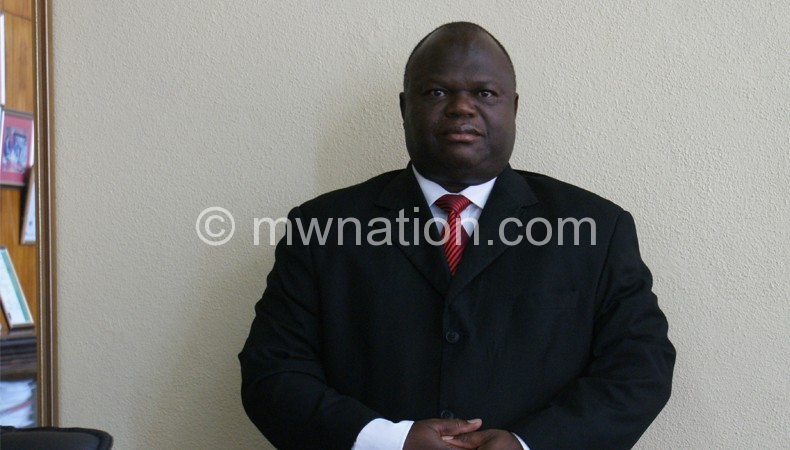It has been a long journey—Kululanga

of teaching and researching
On December 18 2014 Professor Grant Kululanga will deliver an inaugural lecture to mark his formal entry into the ranks of professorship. Kululanga, who is principal of The Polytechnic and first home-grown professor of engineering, gives highlights of his life and the lecture in this interview with our correspondent Jacob Jimu.
Q: Belated congratulations on attaining the status of professor!
A: Thank you very much.
Q: On December 18, 2014 you are delivering the inaugural lecture to mark your formal entry into the ranks of full professors. What does this occasion mean for you?
A: It is an opportunity accorded to me to share knowledge that I hold dearly to society for social economic development through engineering. The sharing knowledge is one of the critical roles of a vibrant university in engaging the community and public so that discoveries from laboratories can benefit people, society and the economy.
Q: Give us a glimpse into your life. Who is Grant Keeble Kululanga?
A: I was born on 20th October 1959 at Zomba General Hospital to the late Keeble Wells Kululanga and late Rhoda Kemilton Kululanga. I am married to Dr Ida Lucy Kululanga. The Almighty God blessed us with three children; namely, Michael, Martin and Miriam. I am a first born son in a family of eight siblings and two deceased. My late father was a civil servant while my mother was a housewife. He served in eight districts of the country as a result of the nature of his work.
I attended a number of primary schools across the country as a result of the transient nature of my late father’s work. The following are the schools that I attended: Mzuzu Primary School, Chigoneka and Conciri in Lilongwe, Nkhotakota LEA and Saint Augustine in Mangochi. I went to Dedza Government Boarding School and was also among the first group of Advanced Level students selected to the Kamuzu Academy as founding students for forms five and six. I was told to join the University of Malawi while waiting for a Commonwealth Scholarship to study in the UK that Kamuzu Academy had secured for its first A-level students. I graduated with a Bachelor of Science in Engineering in 1986 at which time my Commonwealth Scholarship matured and I proceeded to the University of Loughborough in the United Kingdom. I pursued a Master of Science in Engineering at the University of Loughborough and completed my research study in 1987. I returned to the University of Loughborough in 1996 to read for a Doctor of Philosophy in Engineering and graduated in 1999.
I am currently principal of the Polytechnic, a constituent college of University of Malawi. The college has five faculties; namely, Engineering, Built Environment, Applied Sciences, Commerce as well as Education and Media Studies. Apart from lecturing civil engineering students for the past 23 years, I have served as vice-principal, Dean of faculty of Engineering and Head of the Civil Engineering Department. Before joining the University of Malawi, I served in the civil service from 1987 to 1990 as project research engineer with the United Centre for Human Settlement in Association with Rural Housing Project.
Q: At a broad level, what issues will your inaugural lecture address?
A: I will be delivering a lecture on challenges of engineering and the way forward for developing countries, a case of Malawi. I will articulate specific challenges related to social service provision that need engineering interventions and how they could be averted in respect of a growing population. This will be spiced with lessons from some selected nations from Asia who were at the same level as this country at independence.
Q: It has been a long professional journey for you having joined The Polytechnic as a lecturer in 1990. What has kept you going?
A: I have drawn my strength from the Almighty God who has privileged me with his strength, knowledge and wisdom and praise should go to Him. My family has supported me through and through and I also thank God for this.
Q: You have been at the Polytechnic for so many years as a student, lecturer and now principal. What has changed about the college that makes you proud?
A: The Polytechnic has grown since I was a student from just under 500 students to 5000 students of all undergraduate and day release students. Programmes that are offered in faculties have diversified addressing the requirements of specific industries. Four faculties are now offering masters programmes while three faculties are offering PhD research programmes. Four centres of excellence conduct research in applied sciences, engineering, commerce, accounting and management. We have built an excellent network of partnerships with universities in Europe, North America, Asia and Africa for research activities. All the programmes have been strengthened in consultation with public and private sectors and the appropriate local and international professional bodies.
Q: Where do you want The Polytechnic to be in the next 10 years?
A: I am envisioning a premier institution of teaching and research admitting no less than 30 000 students and producing the right quality and quantity of human capital of applied sciences and professionally based programmes that can drive social economic development of this country. n






Congratulations, Grant!